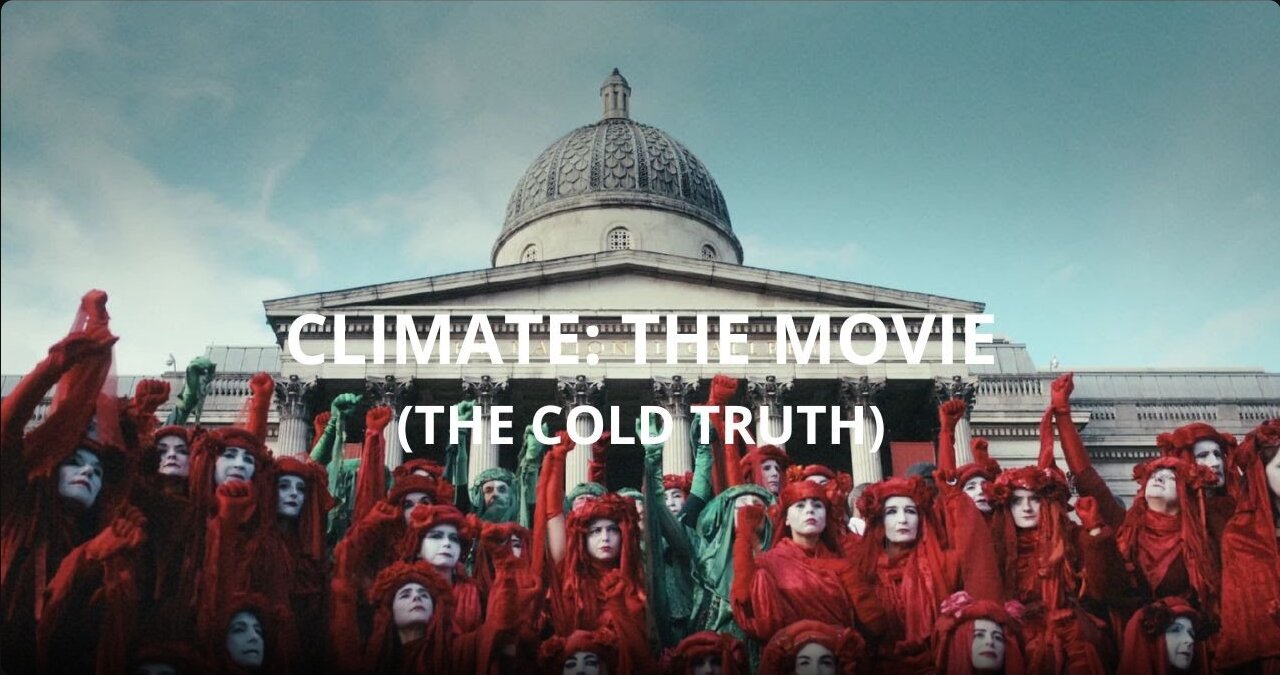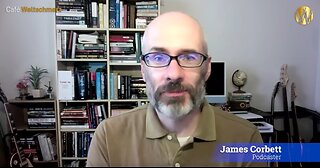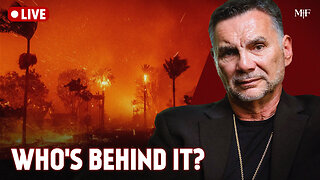Premium Only Content

Climate: The Movie - The Cold Truth (2024)
This film exposes the climate alarm as an invented scare without any basis in science. It shows that mainstream studies and official data do not support the claim that we are witnessing an increase in extreme weather events – hurricanes, droughts, heatwaves, wildfires and all the rest. It emphatically counters the claim that current temperatures and levels of atmospheric CO2 are unusually and worryingly high. On the contrary, compared to the last half billion years of earth’s history, both current temperatures and CO2 levels are extremely and unusually low. We are currently in an ice age. It also shows that there is no evidence that changing levels of CO2 (it has changed many times) has ever ‘driven’ climate change in the past.
Why then, are we told, again and again, that ‘catastrophic man-made climate-change’ is an irrefutable fact? Why are we told that there is no evidence that contradicts it? Why are we told that anyone who questions ‘climate chaos’ is a ‘flat-earther’ and a ‘science-denier’?
The film explores the nature of the consensus behind climate change. It describes the origins of the climate funding bandwagon, and the rise of the trillion-dollar climate industry. It describes the hundreds of thousands of jobs that depend on the climate crisis. It explains the enormous pressure on scientists and others not to question the climate alarm: the withdrawal of funds, rejection by science journals, social ostracism.
But the climate alarm is much more than a funding and jobs bandwagon. The film explores the politics of climate. From the beginning, the climate scare was political. The culprit was free-market industrial capitalism. The solution was higher taxes and more regulation. From the start, the climate alarm appealed to, and has been adopted and promoted by, those groups who favour bigger government.
This is the unspoken political divide behind the climate alarm. The climate scare appeals especially to all those in the sprawling publicly-funded establishment. This includes the largely publicly-funded Western intelligentsia, for whom climate has become a moral cause. In these circles, to criticise or question the climate alarm has become is a breach of social etiquette.
The film includes interviews with a number of very prominent scientists, including Professor Steven Koonin (author of ‘Unsettled’, a former provost and vice-president of Caltech), Professor Dick Lindzen (formerly professor of meteorology at Harvard and MIT), Professor Will Happer (professor of physics at Princeton), Dr John Clauser (winner of the Nobel prize in Physics in 2022), Professor Nir Shaviv (Racah Institute of Physics), professor Ross McKitrick (University of Guelph), Willie Soon and several others.
The film was written and directed by the British filmmaker Martin Durkin and is the sequel of his excellent 2007 documentary The Great Global Warming Swindle.
Tom Nelson, a podcaster who has been deeply examining climate debate issues for the better part of two decades, was the producer of the film. Many of the scientists interviewed in Climate: The Movie have done lengthy interviews for the Tom Nelson Podcast. https://www.youtube.com/channel/UCfZS_wFmJCXqPr4MYtAIN6w
#ClimateTheMovie will be available for free at many online locations starting on March 21 2024. Subtitles for numerous languages are currently being created by the Clintel Foundation. Follow @ClimateTheMovie and @ClintelOrg for updates.
https://www.youtube.com/watch?v=s3Tfxiuo-oM
-
Transcript
0:04
People are dying. Entire ecosystems are collapsing.
0:09
We are in the beginning of a mass extinction, and all you can talk about is money,
0:15
and fairy tales of eternal economic growth. How dare you !
0:26
This is the story, of how an eccentric environmental scare, grew into a powerful global industry.
0:33
It's a wonderful business opportunity, okay ? You want climate, we'll give you climate !
0:38
There's a huge amount of money involved. This is a huge big money scam.
0:43
There are not just now billions, but there are trillions of dollars at stake.
0:50
It's a story of self-interest, and big government funding. People like me, our careers
0:56
depend on funding of climate research. This is what I've been doing, just about my whole career.
1:02
This is what the other climate researchers are doing with their whole career They don't want this to end. If CO₂ isn't having the
1:09
huge negative impacts that we claimed it was having originally. How are we going to stay in business ?
1:15
A lot of people's livelihoods depend on it. They're not gonna give that up. This is the story, of the corruption of science.
1:23
There's no such thing as a climate emergency, happening on this planet now. It's ... there's no, no evidence of one !
1:29
The climate alarm is nonsense you know. It's a hoax. I've never liked "hoax." I think "scam" is a better word,
1:36
but i'm willing to live with "hoax." It's a story about the bullying and intimidation of
1:41
anyone who dares to challenge the climate alarm. To speak up against or about climate change
1:48
in any sort of skeptical way, was essentially career suicide. Activists are even calling
1:54
for any skepticism to be criminalized. It's the story of an assault
2:01
on individual freedom. It's a wonderful way to increase government power
2:06
if there's an existential threat out there that's worldwide. Well, you need a powerful worldwide government,
2:13
you know, to cope with it. We see all these kind of authoritarian measures
2:19
being adopted, in the name of saving the planet. You've suddenly got the population
2:24
under control all over the world.
2:33
We called it industrial progress. Since the industrial revolution, the development
2:39
of free market capitalist mass production, has made ever more goods, ever more affordable,
2:44
to ever larger numbers of people. Mass production marched hand in hand with mass consumption.
2:51
In the modern age, ordinary people enjoy a level of prosperity never before achieved in human history.
2:58
But all the while we're told we were destroying the planet.
3:05
Computers have calculated what is in store for us as we produce and consume ever more.
3:11
The weather will get worse. The planet will boil. We greedy humans must accept
3:16
limits on our lifestyle. Consume less. Travel less. Those who deny the climate crisis
3:23
are not just wrong ... They're dangerous ! Spreading the poison of doubt, among a gullible population.
3:29
These deniers should be shunned, and shamed, and censored. For these climate deniers are flat-Earthers.
3:37
They are anti-science.
3:43
Teaching at New York University is one of these climate deniers. Professor Steven Koonin, is one
3:48
of America's leading physicists. He was a science advisor to President Obama,
3:54
and both Vice President and Provost of Caltech, one of the most prestigious scientific institutes in the world.
4:04
I teach climate science to my students at NYU.
4:09
And I always tell them: Check the data or the papers yourself.
4:14
And they all come out of that course with their eyes wide open.
4:21
Professor Koonin's best selling book "Unsettled," argues that mainstream scientific studies
4:26
accepted by official agencies do not support the notion that there is any kind of climate crisis at all.
4:34
Of course I've been called a denier. And my response is: Tell me what I'm denying.
4:40
Because I'm quoting for you directly, from the official UN scientific reports.
4:48
Dick Lindzen also dismisses the claims of climate alarmists. He's one of the world's leading meteorologists.
4:54
He was Professor of Meteorology at both Harvard University and MIT, and has served on the UN's Intergovernmental Panel
5:01
on Climate Change, or IPCC. Even the Intergovernmental Panel on Climate Change.
5:09
If you go to their section, of Working 1 ... Group 1, which is the science:
5:16
They don't support any of these claims. And I assure you, having served on it ... it's biased.
5:23
But you couldn't get any real scientists to agree some of the nonsense that's being promoted.
5:29
Will Happer is also a denier, and is another of america's leading physicists. He has been science advisor to three Presidents,
5:37
and Professor of Physics at both Columbia and Princeton University. There's this mischievous idea that's promoted,
5:44
that scientific truth, is determined by consensus. In real science, you know, there are always arguments.
5:51
No science is ever settled you know, it's just ... it's absurd when people say the science of climate is settled.
5:57
It's not ... there's no such thing as "settled science." Especially climate !
6:03
Dr John Clauser is one of the most respected scientists in the world. In 2022, he was awarded the Nobel Prize for Physics.
6:11
The science that's being done, is appallingly bad in my opinion. There are a large number of scientists
6:16
who are in violent disagreement. They refer to themselves as skeptics. Since I am no longer worried about
6:23
losing funding, or a job whatever ... I call myself a climate change denier.
6:30
These very eminent and respected scientists and others like them, are not flat-Earthers.
6:35
They do not deny science. So what's the evidence that has caused them to dismiss the climate alarmist's nonsense?
6:50
We are told, that current temperatures are unprecedented, and dangerously high.
6:55
It's possible to check if this is true, because we have evidence of Earth's climate history, dating back hundreds, thousands,
7:02
even millions of years. The desert of Judea, by the Dead Sea.
7:08
Professor Nir Shaviv from the Racah Institute of physics, has come here looking for clues.
7:14
Thousands of years ago this place was underwater, and etched into the rocks are lines,
7:20
which, if you know how to read them tell a story of Earth's climate history.
7:25
And here's the climate: We're at the ake bed of what used to be Lake Lisan.
7:32
It’s a lake that existed until the end of the last ice age. Back then, the lake level was maybe
7:39
a hundred meters above where we're located. When we want to reconstruct the climate of the past,
7:45
we have to look for evidence, for clues. And when the lake existed, it had deposits ...
7:53
and by looking at these layers here, we can actually reconstruct how the climate has changed.
8:00
Warmer water, means more life: The accumulation of more shells and bones from sea creatures,
8:06
and other changes, that are reflected in the ancient layers of the lake bed.
8:12
The lines act, as a kind of thermometer. And this is just one way geologists can reconstruct past climate.
8:18
In other places, we can go to stalagmite caves and see the annual rings that we have in the stalagmites,
8:25
or we can drill cores from the bottom of the ocean and then look at layers there,
8:31
or many other places. But here, I think this is one of the nicest places, because you can actually see,
8:37
you can actually see, how the climate has changed.
8:43
So, when we look back in time, what do we find?
8:51
For 200 million years, dinosaurs roamed the Earth. An Earth marked by fertile dense forests, teeming with life.
9:01
And at no time during those 200 million years, were temperatures as cold, as they are today.
9:08
If you go back let's say ... 200 million years, it was maybe 13 degrees warmer, than it is now.
9:16
So, on the geological perspective, this is not at all unprecedented.
9:23
For the last 500 million years, temperatures have varied greatly. But for almost all that time,
9:29
the Earth was much much warmer than today. Compared to the last half billion years,
9:35
the Earth right now, is exceptionally cold. In fact, there are very few times, when it's been this cold.
9:42
We're relatively cold. Maybe not quite the coldest it's been, in 500 million years, but pretty close to it.
9:50
We are in a remarkably cool period, if we look over the last 550 million years.
9:56
In fact, in only one other time period in that last 550 million years, was the temperature as cool as it is now.
10:03
The mammals who now inhabit the Earth began to evolve around 60 million years ago, when the world was much warmer than today.
10:11
If we just look at the last 65 million years. So this is, after the dinosaurs go extinct.
10:16
Mammals really start to take over and our evolutionary ancestors start to live on the land.
10:22
Any time period, within the last 65 million years was warmer than it is essentially today.
10:28
The Earth's mammals, humans included, appear to thrive when it's warm. Warmer than it is now.
10:34
There is no doubt, that warm is better than cold and geological history. We are a tropical species.
10:40
A human being in the shade naked dies at 20°C, from hypothermia.
10:47
We evolved on the equator in Africa. And the only reason we were able to get out of there eventually,
10:54
was fire, shelter, and clothing.
10:59
Over the last 50 million years, temperatures steadily declined, plunging the Earth, into what geologists call
11:06
the Late Cenezoic Ice Age. We are still in that ice age. The reason there's all that ice on the poles,
11:13
is because we're in an ice age. Everybody knows that, who knows anything about the the history of the Earth.
11:18
This is an ice age. We're at the tail end of a 50 million year cooling period, and they're saying it's too hot.
11:26
If we zoom in on the past few million years, we see temperatures sinking. And as they do, fluctuating between
11:33
extremely cold periods and slightly milder periods. The extremely cold periods are called glacial maxima,.
11:40
when the planet is mostly covered in ice. And the slightly less cold, are called glacial minima,
11:46
when there's just ice at the poles. For the past 10,000 years fortunately, we've been in a
11:52
slightly less cold glacial minimum known as the holocene,
11:58
With milder weather, humans began to emerge from their caves, and several thousand years ago,
12:04
we see the rise of the first great civilizations. In a blissful period which according to many studies
12:09
was considerably warmer than today. This is known as the "holocene climate optimum."
12:16
It was called an optimum, because people thought that warmer was better. Since then, temperatures have declined
12:22
and begun to fluctuate. In Roman times, there was a blissfully warm period,
12:28
followed by a brutal cold period and the dark ages. Then came the balmy Medieval warm period,
12:34
according to many studies, as warm or warmer than today, followed by an especially cold period,
12:41
known as the Little Ice Age, possibly the coldest in the last 10,000 years.
12:46
And here it is: The Roman warm period ... the cold dark age ... the Medieval warm period
12:51
and then the very cold Little Ice Age from which, for the past 300 years or so, we've been recovering.
13:00
The longest instrumental record of temperature in the world comes from central England, and this is what it shows:
13:06
Since the worst of the little ice age from 1650 ... the temperature has risen, gently,
13:11
by little more than 1 degree Celsius. The central England record of temperature
13:18
is a world treasure, you know. It's the longest continuous record that we have, and it's certainly not a very alarming record.
13:26
It began in the depths of the Little Ice Age, and so you can see the slight warming that followed the little ice age
13:34
and there's certainly nothing very alarming that's happening today, at the very end of the record.
13:39
Most of the warming that we're observing today is the recovery from the Little Ice Age, whatever caused that.
13:46
Well you know, we're talking over the entire industrial period ... of about 1 degree centigrade.
13:55
To put this one degree in perspective, let's look at New York Central Park. Records show, that there has been no
14:02
overall change in temperature here, since 1940. But from one year to the next, the average temperature can vary by 3°C,
14:10
without many New Yorkers even noticing. In fact between the warmest year in the 1960s, and the coolest in 2000,
14:17
there's a difference of 5°C. The average temperature on this day,
14:22
in this year, might be 5 degrees different, from the average temperature
14:28
a year ago, or two years. You know, when I hear people pontificating about
14:34
1.5 degrees leading to the end of civilization, I think, what have they been smoking,
14:39
you know, are you crazy? According to thermometer readings since 1880,
14:45
there's been a very mild increase in temperature. Only by stretching the Y-axis on this graph,
14:51
is the increase noticeable. This is the rising line used by official agencies as proof of global warming.
14:58
But is it accurate? Professor Ross McKitrick is an expert
15:05
in statistical analysis, at Guelph University. He noticed something odd about
15:10
modern thermometer records. Thermometers even in the same region, give out very different readings,
15:16
depending on where they're located. I was interested in the question of how do you explain the spatial pattern of warming.
15:22
So some places warm a lot, some places don't warm much. And it turns out tightly correlated with the spatial pattern of economic activity.
15:31
Where there are more people, and there is more human activity, there's more heat. This is known as the urban heat island (UHI) effect.
15:39
Urban heat island effect is essentially London right. You pick London, with buildings, with a lot of activities,
15:46
tend to be of a few degrees, I mean we're talking now Celsius, right. Even 4 or 5 degrees Celsius warmer, than outskirts.
15:52
This is a phenomenon of urbanization. These days, the obvious effect is actually concrete retaining heat.
16:00
This can be illustrated with the satellite heat map of Paris. The center of Paris can be as much as
16:06
five degrees Celsius warmer, than the surrounding countryside.
16:12
Paris, London, Beijing, Shanghai ... you name it ... New Delhi ... all of them,
16:19
absolutely demonstrated those effects. So how has this affected the official temperature record?
16:25
In the early part of the 20th century, it was normal to erect weather thermometers just outside towns.
16:31
Close enough to check every day, but away from the heat of urban life. But over the 20th century, those towns have expanded.
16:39
Suburbs have spread. There are more roads, more cars. Thermometers which were once OUTSIDE towns,
16:45
are now surrounded, by shopping malls, offices, factories, and houses.
16:52
These towns, and all the locations where thermometers are located on average,
16:57
they've all grown in population, let's say since 1880. You've got buildings growing up around the thermometers,
17:04
you've got parking lots, so you've got all of these non climate influences, which are
17:09
affecting the temperatures which raises questions about the quality of thermometer data for monitoring global warming.
17:16
To correct for this corruption of the data, an obvious solution, is to use only records from rural weather stations, which have been
17:23
less affected by urban development. This has now been done by a team, led by Dr Willie Soon.
17:29
We combined all the best rural stations. Any .. anything that we can correct for, we correct for.
17:35
And we show, if you don't use this dataset, and use only rural, you .. you get
17:40
a very different kind of picture. According to rural temperature records,
17:45
temperatures rose from the 1880s but peaked in the 1940s. Then, there was a marked cooling until the 1970s.
17:53
After that, temperatures recovered, but are still today barely higher than they were in the 1940s.
18:00
What we see is that basically, you have a warming, from the 1900s, 1850s or so
18:06
to the 1930s and 40s and started to warm and then cool, in a substantial way, to the 70s about 76 or so.
18:13
Instead of a long term systematic warming trend, it has a variability. Multi-decade, or like
18:19
every 50 - 60 years or so kind of a variation.
18:24
It's not just rural thermometers that show little warming. Merchant ships and other naval vessels have been measuring
18:31
the temperature of the sea since the 19th century. In red, we see the land temperature record, since the
18:38
1860s which has been inflated by urban thermometers. But in blue, is the ocean temperature record.
18:45
From around 1900, the two begin to diverge. Ocean records show far less warming in the 20th century,
18:51
and the pattern more closely resembles the rural temperature record.
18:58
Sea is not supposed to be "contaminated" by urban heat island effect. Am I right, yes ? So, when we compare the two records, within
19:05
the range of uncertainty: this behavior actually fits. Scientists have also studied temperature change,
19:11
by looking at tree rings, which again shows very little warming. There's a gentle rise till the mid 20th century,
19:17
a cooling to the 1970s, followed by a mild recovery. Once again it shows, temperatures today,
19:24
are barely different to those of the 1930s and 40s, and the pattern closely resembles rural temperatures.
19:34
Satellites too, seemed to be telling a different story. Our ability to measure global temperature accurately
19:41
took a leap forward, when satellites began to orbit the Earth. One of the scientists who pioneered
19:48
the use of satellites to measure temperature, is Dr Roy Spencer, who, in the 1980s, was senior scientist for climate
19:54
at NASA's Marshall space flight center. We were discussing over lunch:
20:00
isn't there some way we can use satellites to monitor global temperatures. Because, as you know the temperature network
20:07
of thermometers is pretty skimpy around the world. So it's kind of hard to get a global temperature.
20:15
Dr Spencer's development of weather satellites was revolutionary. He, and his colleague, Prof John Christy have been awarded
20:21
NASA's medal for exceptional scientific achievement. Our satellite data begins in January of 1979.
20:28
That's when we had complete global coverage, and we have it right up to the present.
20:35
There was one critical question about temperature, that satellites were singularly well equipped to answer.
20:41
Has there been a spurious warming that has crept into the global temperature record over land,
20:48
that's just a result of an increase in population ? And that's something that we've been analyzing,
20:54
and working a lot on lately, and we're finding that, especially in urban areas ... It's large !
21:00
And since 1880, most the warming, it looks like, is due to the urban heat island effect.
21:06
We're lucky to have a few independent scientists, like John Christy and Roy Spencer,
21:12
with their satellite measurements of temperature. You know, before they started releasing this,
21:19
ground based temperature records were going wild. And they were going up, you know, Like crazy.
21:26
with no bounds, but now they have to contend with the fact that there's this independent,
21:31
and probably better way of measuring, the whole globe's temperature, which is not alarming at all.
21:40
Evidence from multiple sources now agree, that the official global temperature record as used by world governments
21:46
and reported in the world's media, is showing far too much warming over the last 120 years,
21:52
artificially inflated ... by urbanization. You look at the weather balloon record, the satellite record, the rural record.
21:59
The ocean record doesn't warm nearly as much as land. All of these indications show that the, like ...
22:05
the big warming pulse in the record, is the northern hemisphere land record. And that's also, where most of this
22:12
data contamination is happening. But, of the mild warming that has taken place in the last three to four hundred years, can any of it
22:20
be attributed to human emissions of CO₂?
22:31
Professor Henrik Svensmark is visiting the Hebrew University of Jerusalem, and taking a stroll in the evolution garden, dedicated to
22:39
preserving the oldest surviving plant species on Earth. These plants aren't just pleasing on the eye.
22:46
They can also tell us about levels of CO₂ in the atmosphere in Earth's geological past.
22:52
What we have here is a Ginkgo tree, and it's actually a living fossil in the sense that this
22:58
type of tree first appeared about 270 million years ago.
23:04
On the underside of the leaf, there are what we call stomata, the cells, where they can uptake CO₂.
23:11
So they're actually measuring how much CO₂ is in the air, and then they adjust the number
23:17
of these stomata, to how much CO₂ there is. And by looking at fossils, and measuring
23:23
how many there are at a different time, it says something about what was the level of CO₂ back in time.
23:32
So, when we look back in time, what do we find? Over almost all, of the last 500 million years,
23:38
the level of CO₂ in the atmosphere has been far, far higher than it is now. Even with modern industry's contribution to CO₂ levels,
23:46
by geological standards, the level of atmospheric CO₂ today is close to being as low, as it has ever been.
23:55
At present, we have about uh, 400 parts per million. Fifty million years ago,
24:01
it might have been 2000 parts per million. So, a much much higher concentration of CO₂.
24:09
I think current estimates of global CO₂ is 423 or so parts per million today.
24:15
If we look through the phanerozoic the last 550 million years, we would see CO₂ on the order of 7000 parts per million.
24:25
CO₂ is plant food, and the result of much higher levels of atmospheric CO₂ in the past, was a much, much greener world.
24:33
Periods of elevated CO₂ tend to be time periods of huge biodiversity on the planet.
24:40
In fact, we're in a CO₂ famine if we look over the last 550 million years.
24:47
At the depths of the most recent glacial maximum, the amount of CO₂ in the atmosphere sank so low,
24:53
all life on Earth came close to extinction. They say CO₂ is higher than it's been
24:58
for one 100 thousand years, but what they don't tell you in that period they're talking about, is that CO₂ sank so low, that all life on Earth nearly died.
25:06
20,000 years ago, CO₂ is at the lowest level it has ever been in the history of the Earth, 180 parts per million.
25:14
If it had gone down another thirty parts per million, we'd all be dead.
25:19
There is a low point of CO₂, where photosynthesis becomes so inefficient,
25:24
that plant life would die. Then everything else starts to perish after that.
25:30
During the last glacial maximum, there's good evidence that, in many parts of the world
25:36
there was plant starvation, from not enough CO₂. So, we should be very grateful that CO₂ levels are
25:44
beginning to go back up. We're still far from the historical norms which would be several thousand parts per million.
25:50
There's not enough fossil fuel to get there, but at least we're making a start.
25:57
But has the small recent increase in CO₂, affected the temperature?
26:02
We would now show you a picture of CO₂, but we can't, because it's invisible. CO₂ makes up a tiny fraction of the gases in the atmosphere.
26:10
Just 0.04 of a percent. It is just one of 25 different greenhouse gases,
26:17
which taken as a whole, form only one part of Earth's complex climate system.
26:22
So what evidence is there, that this trace gas is having any noticeable impact on the climate?
26:29
If it were true, that high levels of CO₂ caused higher temperatures, we should be able to see that in Earth's climate history.
26:37
Here, scientists are drilling into ancient ice cores. These cores tell us both about past temperatures, and CO₂ levels.
26:45
Scientists have indeed found a link between temperature and CO₂. The trouble is, it's the wrong way around.
26:53
Though it's true over the last few million years of the ice age we're in now, that CO₂ and temperature are correlated.
27:01
But if CO₂ is the driver, it has to change first. and the temperature has to change second.
27:07
In fact, when you start to look at the data very specifically you see the exact reverse. Temperature starts to rise first, and then,
27:14
on the order of a century to a few centuries later, we start to see us a rise in CO₂.
27:19
it's long been known that the temperature actually moves first. So, temperature goes up, CO₂ goes up after that.
27:27
Temperature goes down, CO₂ goes down. Ice ages start when CO₂ is at it's maximum, and ice ages end,
27:36
when CO₂ is at its minimum, which is the exact opposite of what would occur
27:42
if carbon dioxide was controlling the temperature. The question of whether CO₂ drives the climate is easily resolved.
27:47
You can look back in time over hundreds of millions of years, CO₂ levels have changed radically many times.
27:53
Does this cause temperature change? No! Absolutely not! CO₂ has never driven temperature changes in the past, never.
28:01
Nor is it clear in recent times, that CO₂ is having any effect on temperature. Here we see industrial output of CO₂ since 1750.
28:10
From the mid 19th century, to the mid 20th century, there was only a slight increase. It's not until the 1940s, that industrial production
28:17
of CO₂ begins to take off. But this doesn't match the temperature record.
28:22
According to rural thermometers, most of the warming in the past 200 years, occurred before the 1940s,
28:28
and have barely changed since then. One of the embarrassments,
28:33
that IPCC doesn't like to talk about, was that the 1930s, when human influences were much smaller,
28:41
were particularly warm. That's the puzzle that the first early part, where we have such a sharp warming,
28:47
from the 1900s and 1930s and 1940s ... the CO₂ could never cause that temperqature rise.
28:54
That the 1930s and early 40s was so hot, is puzzling. More puzzling still, is what happened next.
29:02
By the end of World War 2, CO₂ was really going up. And yet, the temperature was going down.
29:09
From 40 to 70, while the CO₂ do continued to rise, this thing started to cool ... What happened?
29:15
Journalists were writing about the coming ice age. It was on the cover, of Time Magazine.
29:22
The 1970s new ice age was the big story. And how about since the 1970s?
29:28
According to computer climate models, over the past half century, rising CO₂ should
29:33
have led to this increase in temperature. But, according to multiple satellite and balloon
29:39
measurements, what actually happened was this. Well what we've found from the satellite
29:45
data, is that the global atmosphere is not warming up as fast, as the climate models say it should be.
29:54
There's a couple dozen climate models now that have been worked on for decades.
30:00
You know, billions of dollars, tens of billions of dollars have been invested in these climate modeling efforts,
30:05
and we find that generally speaking, virtually all of the climate models produce too much warming,
30:10
over this period, since 1979 up to the present. Now, even if we say the surface thermometers are correct.
30:19
They still don't produce as much warming, as most of the climate models say there should have been,
30:25
let's say in the last fifty years. The models, individually and even collectively, when you average over all of them,
30:32
in so-called ensembles: They don't get it right. You can already see, that the main
30:39
support of the climate alarm movement which are these enormous computer models,
30:44
They're clearly wrong! They don't agree with what we observe. And they .. they're all running much too hot.
30:51
They don't get the geographical distribution of temperatures anywhere close.
30:57
They don't get El Niño, La Niña cycles. They're just ... nonsense.
31:03
All climate models are based on the assumption, that CO₂ drives temperature change.
31:08
But actual observations and historical evidence, clearly suggests that it doesn't.
31:13
Yes I assert, that there is no connection whatsoever, between CO₂ and climate change.
31:20
It's all a crock of crap in my opinion. There is no truth to the idea, that
31:26
the Earth is warmer now, than it has been in the past. It's a lie. There is no truth, that CO₂
31:32
is higher than it should be. That is a lie. Earth's climate has changed many times,
31:39
over the course of its long history, and will continue to change, without any help from us.
31:44
Climate always changes, you know. Who denies climate change? It's always changing.
31:50
But if CO₂ doesn't drive climate change, what does?
32:01
In Earth's atmosphere, there are powerful forces at work. And perhaps the most powerful of all, are clouds.
32:09
CO₂ is quite unimportant, in controlling the Earth's climate. What is important is clouds.
32:16
Clouds don't absorb any energy at all. They simply reflect all the sunlight, back out
32:23
into space. Big bright white clouds. If you look at the Earth, you see lots and lots of them,
32:29
and they vary dramatically, from one day to the next. That is hundreds of times more powerful,
32:37
than the trivial effects of CO₂. But what controls the number and density
32:44
of clouds on Earth? Professor Henrik Svensmark from the Danish National Space Institute is in Jerusalem
32:51
with the astrophysicist Nir Shaviv. Together, they've been exploring cloud variation,
32:57
and it's effect on climate. And strangely, they found a link between clouds and exploding supernovae, far off in our galaxy.
33:06
When we have big stars, they don't live very long, and relatively, only maybe, a few million years,
33:14
up to forty million years. But they end their life in a huge explosion which we called a supernova.
33:25
An exploding supernova sends out vast quantities of debris. Tiny charged subatomic particles, known as
33:32
cosmic rays, traveling almost at the speed of light. And as they hit Earth, they develop into seeds
33:39
which attract water vapor, and form clouds.
33:45
Professor Shaviv noticed, that the amount of cloud cover on Earth, is related to our journey around the Milky Way.
33:52
As our solar system orbits the galaxy over millions of years, It passes through the galaxy's spiral arms,
33:59
dense clusters of stars. As it does, we are exposed to more or less
34:04
cloud forming cosmic rays. And this corresponds, to historic temperature changes on Earth.
34:11
The really mind boggling thing, is that using geology, you can reconstruct
34:17
the climate on Earth over the past billion years, and you can reconstruct our galactic journey.
34:23
And both tell the same story. But what about temperature change on shorter timescales?
34:32
The Sun, our source of heat and light. A seething mass of gigantic magnetic storms,
34:38
which vary in strength and number over time, and which affect us directly and indirectly.
34:45
When it is very active, the sun sends giant gusts of solar wind through the solar system.
34:54
The solar wind warms us indirectly, by acting as a barrier, limiting the number of
34:59
cloud-forming cosmic rays reaching Earth. So, from the sun, we have
35:05
the solar wind, that carries the sun's magnetic field. Out to a large distance, and it works
35:10
like a shield, against the cosmic rays. That when the sun is more active,
35:16
you have a stronger solar wind. You have less cosmic rays reaching
35:21
the inner solar system, and reaching the atmosphere, and the clouds, which are then formed, are less white. They reflect less of the sunlight.
35:29
Which means, that it's going to be warmer here on Earth. Here's a proxy reconstruction of ocean
35:36
temperatures, over thousands of years. And here is one of solar activity, over the same period.
35:42
What is causing the ocean temperature to change is clearly variations in solar activity.
35:51
Because IPCC is determined to go on a narrative, that only CO₂ can drive the climate system,
35:57
they turn off the sun essentially, right? Because the sun is just a background thing for them, that it doesn't do anything.
36:04
Astrophysicist Willie Soon decided to look again at the rural temperature record for the past 150 years.
36:12
Then he looked at a record of changes in solar activity over the same period. To Dr Soon, it was obvious that it was
36:18
the sun, not CO₂ that was driving temperature. WILLIE SOON - As of 2023, IPCC says this,
36:26
that the sun has absolutely zero chance to explain the changes of the climate system, on a broad scale.
36:33
Let's say global warming in the northern hemisphere. We say no! We can easily demonstrate it.
36:40
All of it has zero for the CO₂, 100% for the sun, how's that?
36:46
Why are these and other studies never reported in the mainstream media? And if climate change is natural, what are we to make of
36:53
the alleged terrifying increase in extreme weather events? Of the heat waves and hurricanes?
36:59
Of forest fires, droughts and the rest?
37:08
My first instinct as a scientist, and what I teach my students is, well let's look at the data.
37:14
And when you do that, you discover, as you can read in the IPCC reports themselves, that it's pretty hard
37:22
to find trends in extreme events, much less attribute them to human influences.
37:29
You now had decades of putting the idea in people's heads, that anytime the weather's bad,
37:35
It's climate change and greenhouse gases. So I think people at this point can't help themselves. If you have a heatwave, immediately everybody's thinking:
37:43
"Oh, what have we done to the weather?" If somebody says in the news "This is the warmest day since 1980" or something,
37:52
well you can look up the temperature records, and see for yourself, whether it was in fact, warmer in the 1930s, as it often is.
38:01
US temperature records are the best in the world. And here is the official U.S. government record
38:07
of heatwaves in the U.S. over the past century. It shows very clearly that the 1930s were far more
38:14
prone to heat waves, than we are today. Not only were there more heatwaves in the 1930s.
38:20
The heatwaves then, were much hotter than those of today. Likewise, official figures show, that the number
38:27
of hot days in the U.S. has markedly declined.
38:33
The United States was much hotter in the 1930s. North Dakota reached 121°F (49°C). South Dakota
38:41
was 120°F (49°C). Wisconsin was 114°F (46°C). These sort of temperatures are just completely out of range
38:49
of anything people experience now. A common mistake is to suppose, that higher average
38:56
temperature will mean more hot weather, but this isn't true. Here again, is the central England temperature record,
39:03
the longest instrumental temperature record in the world. Summer temperatures, over the past 300 to 400 years, since
39:09
the end of the Little Ice Age, have barely changed at all. It is winter temperatures, that have been slightly rising.
39:16
The Earth's climate has not been getting hotter, it's been getting milder.
39:21
That's certainly been observed all over the world. If you look at temperature records, high temperatures are almost unchanged.
39:28
But cold temperatures at night or during the winter, are going up a little bit. Not very much but you can measure it.
39:36
When the average goes up, It's really more due to the coldest temperatures getting warmer.
39:44
So the temperature's getting milder, rather than getting hotter.
39:50
What about the increasing number of wildfires we're often told about ? If you look at the actual
39:56
number of forest fires, from satellite observations, the actual number's going down.
40:02
Here's an estimate of global wildfires since 1900. It shows a clear decline.
40:08
And here is record of areas affected by wildfires in the U.S. It shows that wildfires were far, far worse in the 1930s.
40:17
From 1930s and 1920s when you have data, the thing was huge! Five to ten times bigger than the current level.
40:25
How about hurricanes? The U.S. has by far, the best record of hurricane activity in the world.
40:32
Over the past 120 years, there is no overall change. In fact, the trend is slightly down.
40:41
When you look at the data for hurricanes, technically tropical cyclones, you see, that there is no long term trend.
40:50
How about the rest of the world ? Here is a chart of global hurricane activity over the past forty years.
40:57
Hurricanes have been around forever, you know. We've got good proxy records of hurricanes,
41:02
and there's been no change in their frequency. Even the IPCC admits that.
41:09
How about melting ice caps and drought? Here's a satellite record of temperature in Antarctica,
41:15
since the late 1970s. It shows no increase whatsoever. And here is record of global drought since 1950.
41:23
There is no observable increase at all. Polar bears are meant to be going extinct,
41:30
but studies suggest, their numbers are growing. The great barrier reef too, has recently reached record levels.
41:39
There's no such thing as a climate emergency happening on this planet now. It's ... there's no evidence of one.
41:45
Yeah, the extreme weather event story is, is just absurd. There's no basis to it at all. It's just based
41:51
on propaganda. The actual data shows the opposite. I've shown you the official data,
41:57
the official science. Tell me, what I'm denying. The climate alarm is nonsense you know, it's a hoax.
42:05
I've never liked "hoax." I think "scam" is a better word. But I'm willing to live with "hoax."
42:14
But why are we told, again and again, that manmade climate chaos is an undisputed
42:19
scientific fact, beyond question, beyond doubt?
42:25
To answer this, we must examine the so-called consensus on climate change.
42:33
Until the 1980s, global warming was little more, than an eccentric scare story, put about by radical environmentalists.
42:40
But then, the cause was picked up by an ambitious young Senator, Al Gore, who would soon become Vice President.
42:46
A billion dollars a year of public money was made available, for research into climate change.
42:51
This quickly rose to two billion Up to that level ... Academic researchers in various disciplines,
42:57
began to apply for this climate funding. If you want to qualify for money,
43:04
that's labeled "climate." Well, you take whatever you're doing, and you add a little bit of "climate speak" to it,
43:12
and away you go. You're dealing with the sexual habits
43:17
of cockroaches. You'll add ... add the impact of climate. So all I have to do, is add a little
43:25
wrinkle to my grant application to explain how, well I'm worried that climate change will mean the death of
43:30
all the maple trees, and so right away, you qualify for funding. Academics of every kind, lined up for climate funding.
43:39
Climate, became an exciting new area of interest, for sociologists, biologists, Professors of English literature,
43:46
lecturers in gender studies, and many more. And it also served to create a community.
43:54
I mean, you know, you've become a climate scientist now. Even though you know nothing, about the physics of climate.
44:02
Thousands of papers were published ... on climate change and prostitution, climate change and beer,
44:07
climate change and the black death, climate change and disability, climate change and video games, and everything else imaginable.
44:13
There's an almost comical list of studies out there. Just do a Google search on
44:19
"Climate change, AND" and everything comes up. Few of these papers ever questioned,
44:25
whether climate change was actually true. After you've done the research and you write the paper up, sometimes you find
44:33
there's no effect at all, from climate. But you still have to say in your papers, oh yes, climate change is real,
44:39
and we just need to study this some more. Since so few of these so-called climate studies
44:44
challenged the idea of climate change. It was declared, that there was a scientific consensus.
44:50
Climate change must be true. Climate also became a new focus
44:56
for government-funded research bodies. Scientific research in the United States
45:02
tends to be dominantly funded by government grants. And so, whatever government grants are offered,
45:10
sort of determines much of the science being done. It was during the cold war, that many
45:16
government research bodies were set up. But the end of the cold war, and pressure on
45:22
government spending has left many of them struggling to justify their continued funding.
45:29
The United States Congress only funds ... problems. Okay, research into problems.
45:35
Whether it's money that goes to NASA, or NOAA, or National Science Foundation or Department of Energy,
45:41
or any other alphabet soup, you know, organization. It's always been a problem to support
45:46
your research, or your existence, your raison d’etre. And so, climate was a godsend.
45:53
If congress is willing to pay you to find evidence of global warming, by golly,
45:59
as a scientist, we're going to go find evidence of it. Because, that's what we're being paid to do.
46:04
And guess what: If you don't find evidence, or say the evidence suggests, it's not a problem..
46:09
Your funding ends. This totally corrupts the way we look at the science.
46:16
Who was the famous gangster who was asked "Why do you rob banks?" And he said: "Well, 'cause that's where the money is!"
46:25
The climate alarm brought funds. And the bigger the supposed threat, the more funds seemed to flow.
46:32
The publicly funded science establishment now had a direct financial interest, in playing up the alarm.
46:38
But there's a huge incentive to overexaggerate, or to speak in hyperbole, even if
46:44
the data doesn't support exactly what you're saying, because that's what brings the funds.
46:50
I was in that boat. I was someone that was defending climate change as a grad student quite a bit,
46:55
because, the truth is, I didn't give it too much thought. But I ... I thought: Well, it's getting a ton of attention,
47:01
it brings a ton of money into the Earth sciences. Even if I don't buy all the hyperbole, what's the problem?
47:10
By the late 1990s, what had started as an environmental scare story, was gaining momentum.
47:22
Western governments, and their senior civil servants were more than willing to address the climate problem.
47:28
Green taxes were levied, green regulation expanded, and this in turn, generated more climate related jobs and activity.
47:37
Take the banking sector for instance and say to a banker what we want you to file reports with the
47:43
regulatory commission, on how climate change is going to affect your bank. Well, a banker doesn't know anything
47:48
about this subject. So then, they have to commission studies from academics. And of course, the academics
47:54
are happy to come and tell them: "Well, It's going to be terrible for your bank. It's going to cause all kinds of problems.
47:59
And you need to give us money to research this." Green subsidies and regulation meant,
48:05
there was now money to be made in climate. Renewables firms sprouted, consultancy firms offered advice
48:11
on what they called sustainability, and climate compliance. It's a wonderful business opportunity, okay?
48:18
You want climate. We'll give you climate. The renewables industry alone, now turns over a trillion dollars
48:25
a year, and that's expected to double in the next few years.
48:30
What used to be a cottage industry, has now blossomed, to become a major part of the world economy.
48:38
The growth of this climate industry has seen an explosion of highly paid green jobs, Chief Sustainability Officers,
48:45
Carbon Offset Advisors, ESG Consultants, Climate Compliance Lawyers, and countless others.
48:52
Students started to come in to our departments as Earth science departments ... with a focus on climate. That never happened before.
49:01
But they started to look at their career prospects, and they're smart, and they were looking at who's hiring.
49:08
And the fact of the matter was, that everything in the hiring pool had "climate" somewhere attached to the name.
49:14
I started a few years ago seeing programs like a master's degree in "Climate Finance."
49:20
And, I just thought ... what on Earth is Climate Finance? I'd understand what a master's degree in Finance is.
49:26
Well, now you need a university that’s gonna teach this program. You need "Professors" of Climate Finance.
49:32
Every single school, or university, or business, will have a climate office, or climate officers,
49:40
and a climate program. And you look at any of these institutions, or businesses, you will find they all are
49:47
signed up to it, and anyone who hasn't signed up ... will come under pressure.
49:53
At the last gathering of the publicly funded UN's IPCC, 70,000 delegates flew in, from around the world.
50:01
Government bureaucrats, green NGO's, Carbon Sequestration Consultants, environmental
50:06
journalists, heads of renewables companies. But this is just the tip of the iceberg. Many hundreds of thousands of jobs worldwide,
50:14
now depend on the climate crisis. You start building this enormous
50:20
population, whose job is ... to manage the crisis.
50:26
And, and also explicitly, to make sure the people are
50:33
alarmed about the crisis, because this whole industry depends on the existence of the crisis.
50:39
But therein lies, the one great threat to this multi-trillion dollar industry. All the jobs, all of the funding, are
50:46
totally dependent on there being a climate crisis. If CO₂ isn't having the huge
50:53
negative impacts, that we claimed it was having originally. How are we going to stay in business?
50:58
How do we justify our existence, if climate change isn't this existential threat that we claimed it was
51:04
over the last four decades or so? People like me, our careers depend on funding of climate research.
51:12
This is what I've been doing just about my whole career. This is what the other climate researchers are doing with their whole career.
51:18
They don't want this to end. If NASA said: "global warming is not a problem."
51:23
What if their funding disappears, right? So, they can't say that. I mean, you've got the United Nations' Intergovernmental
51:31
Panel on Climate Change: if they said the climate isn't changing, they'd have no reason to exist.
51:38
The IPCC has a self-preservation instinct, to show that climate change is an existential threat.
51:44
Otherwise there's no reason for them to be collecting the money and doing the work in the first place.
51:49
There are not just now billions, but there are trillions of dollars at stake.
51:55
There's a huge amount of money involved. This is a huge big money scam. A lot of people's livelihoods depend on it.
52:03
They're not going to give that up. If suddenly, the notion becomes apparent, that this is not such a problem.
52:12
You're going to see that as an existential threat. Scientists who studied the natural causes of
52:18
climate change, began to be viewed with suspicion, as two Harvard astrophysicists discovered.
52:24
How much does the sun change? And how does it change? And why does it change?
52:30
And then, we didn't even want to get into the temperature record, and this climate thing. Immediately, they will come after us because,
52:36
when we started to estimate that the sun changed by quite ... significantly in terms of climatic sense.
52:43
Immediately they attack us there, because it's not following the narrative. Because they need the CO₂ to be the only one, the only dominant player.
52:51
When you tried to say, we're just looking for the background of natural variability,
52:58
weak ... the response would be: We can't have natural changes. As an effect it has to be human caused.
53:06
And ... some of that was directly stated, but most of it was indirect.
53:11
Your funding for this kind of project will be dropped. This kind of project doesn't go anywhere.
53:18
By that time, anything that contradicted the narrative of global warming,
53:25
as a serious problem, was not going to get funded.
53:31
Editors of academic journals came under pressure not to accept papers, which were deemed to be skeptical of the climate crisis.
53:39
We will not publish anything that questions this. I mean, it's not something surreptitious.
53:47
Scientists who dared to point out in public, that there was no climate chaos, began to be sidelined and shunned.
53:54
If a scientifically qualified person stands up and says: "We don't see an
53:59
upward trend, in the data on Pacific typhoons." Well, suddenly they lose standing, to address
54:05
the topic of pacific typhoons. Not because what they said is wrong, but because it's off message.
54:11
They can marginalize any kind of criticism of the narrative,
54:16
by saying: "You're not qualified to talk about this," because you don't support the narrative. That is then ...
54:23
And then, having marginalized everyone who doesn't support the narrative they can turn around and say: Well, everybody who counts, supports the narrative,
54:29
so he must be right. Environmental journalists ignored skeptics, and instead
54:35
offered headlines to anyone prepared to make the most outrageous claims and predictions about a climate apocalypse.
54:42
It's gotten to where it has nothing to do with the science any more. It doesn't matter, if your alarmist prediction, doesn't come true.
54:50
You're still going to retain your status as an expert, and the media is still going to come and ask you for your opinion,
54:57
even though you were "crazy wrong" about your predictions.
55:05
But the consensus on climate, is not only enforced by those in the climate industry.
55:10
To explain the broader appeal of the climate alarm, we must look at the politics behind climate.
55:26
From the start, the climate scare was political. It came from the environmental movement,
55:31
the sworn enemy, of free market industrial capitalism.
55:37
Finally, we've got them. We can claim, that it is the free markets who are destroying
55:43
the planet, and we need big government to save us. The climate problem, it is said, stems from the
55:51
irresponsible actions of greedy feckless individuals, who have too many babies and drive too much,
55:57
and consume too many products, under the capitalist corporations who pander to their whims.
56:03
The solution is for government to have greater power to regulate private companies, but also to guide and reshape the lives and habits of individuals.
56:12
Policy agenda has sprawled into micromanaging everybody's lives, on the most minute detail.
56:19
What kind of stove you can use, what kind of heater you can have, how much you can set the thermostat at, where you can drive, what kind of car, you can't ...
56:27
According to the the planners, we're not going to have internal combustion engines, an hour from now ...
56:33
All of these things require the government to get involved right? Because the government has to sort-of force changes upon the public.
56:39
If it was up to the public, we wouldn't be buying electric vehicles, because you know, they're impractical.
56:46
Support for the climate alarm is now virtually synonymous with disdain for free market capitalism
56:51
and a yearning for bigger government. It's liberals vs. conservatives in the United States, and generally speaking, liberals are
57:00
worried, that we're destroying the planet. and they're also of course for big government. And then, conservatives are at the other end of the spectrum.
57:08
Where they, a lot of them don't believe, that we're destroying the planet and ... they don't want government involved in their personal lives.
57:15
Paying lip service to the climate alarm has become almost universal among those who depend on government for
57:21
their livelihoods. This includes those in the publicly funded education arts and science establishments.
57:28
Tony Heller recalls his time at Los Alamos labs. The entire county of Los Alamos was kept going
57:36
by government money, that we had the highest incomes in the state.
57:41
So naturally, people who lived at Los Alamos supported big government, because
57:47
that was where their livelihood came from. That was where their good schools came from. Everything good in Los Alamos, came from the government.
57:54
So of course, they were all believers in big government.
58:00
Among the largely publicly funded western intelligencia, support for more government spending and regulation
58:06
is almost a defining moral badge. In these circles, to question the climate alarm
58:12
is socially unacceptable. To be a climate skeptic, is taboo.
58:19
Somebody that goes against it, really does get met with a lot of anger and vitriol and ...
58:26
you know, you're called a denier, the science denier, the heretic. Your colleagues won't engage
58:32
with you anymore. You don't get invited to conferences. Your students may desert you. This is all really terrible.
58:44
Professors Henrik Svensmark and Nir Shaviv, describe what happened, when they published their results,
58:49
on the climatic effects of solar activity. It was like all hell had
58:54
broken loose, because of this work. I had no idea, that the things would escalate as they did.
59:02
And it completely changed my life. Once we said that, people didn't like
59:09
hearing it, and we became "persona non grata." I mean, I have so many instances of people doing
59:16
really nasty things. When I applied for a job.
59:24
A group of scientists write to the university, saying they shouldn't hire me.
59:30
And that's a typical story ... unfortunately.
59:36
If you don't agree with the standard polemic, you become an outcast. You’re shunned, as if you have leprosy.
59:47
For Professor Sallie Balliunas, the personal attacks became too much.
59:54
I retired early.
1:00:00
And my family said, I should have retired even sooner. Years sooner
1:00:05
So, they notice the toll. It took a toll on them ... and me.
1:00:13
Dr Matthew Wileicki, was an Assistant Professor of Geology at the University of Alabama,
1:00:18
when he decided to speak out about the climate scare. As a result of the backlash, he has decided to leave teaching.
1:00:25
To speak up about climate change, in any sort of skeptical way, was essentially career suicide, absolutely.
1:00:31
There was no possible way, that I would ... publish in, quite a few of the mainstream journals,
1:00:37
that I was required to publish in. I essentially isolated myself from many of the funding institutions.
1:00:44
This is one of the reasons, you can build a concensus in a community, is because anybody who is skeptical of that
1:00:51
consensus, essentially gets kicked out of the community. speaking out, in scientific ways
1:00:59
that go contrary to the consensus, I would say, is a career killer for people at the early stage of their careers.
1:01:08
If I were 30 years old in a university, trying to make a career, I would certainly keep my mouth shut.
1:01:15
And in fact, I went to some effort to keep my mouth shut when I was younger. I knew climate was nonsense then,
1:01:22
but I was a little bit careful. If a young person is questioning this.
1:01:28
They can't put that in a proposal. The proposal will be denied.
1:01:34
And they can't effectively publish. Because the gatekeeper will keep them out,
1:01:39
and so it would end their career. You have to go along
1:01:45
with the global warming story. If you don't, you're going to get cut off. You'll lose funding, you're going to get your career ruined.
1:01:52
You're going to be trashed by the community. You'll be despised by your coworkers.
1:01:59
The so called consensus on climate, has itself become a weapon. A form of bullying, intimidation, and censorship,
1:02:06
used against those, who refuse to conform. It's a tool, that people use
1:02:11
to bludgeon their opponents and the skeptics, and to attack their character.
1:02:17
According to it's critics, far from being scientific, the militant, intolerant, climate consensus
1:02:23
represents a devastating assault on free scientific inquiry. I see my job as a scientist,
1:02:30
as just laying out the facts, and letting people decide what they want to do. When you can't talk
1:02:36
about the facts, things become corrupt. If you shut the door on ideas.
1:02:43
If you say, you're not allowed to test it. You're not allowed to have that idea.
1:02:49
You've left the realm of science. I don't think climate researchers
1:02:55
will ever back down from their claim, that increasing CO₂
1:03:01
is the control knob, on today's climate system. I don't think they will ever back down from that,
1:03:08
no matter what the evidence is. It's clear, it's now a cult!
1:03:13
And completely divorced from science.
1:03:18
But the apparently unstoppable climate scare, does not just represent an attack on science.
1:03:24
It is starting to shape for us, a new kind of society.
1:03:34
Environmentalists like to pose as anti-establishment. But their demands are well received and piously echoed
1:03:42
by king Charles, the Archbishop of Canterbury, the BBC, the UN, the EU, by heads of government,
1:03:48
the World Bank and World Economic Forum. In fact, by the entire state-funded ruling establishment.
1:03:56
Global warming is like the perfect problem that government can get
1:04:02
involved in, to grow the influence of government. It's a wonderful way to increase
1:04:08
government power and, If there's an existential threat out there, that's worldwide. Well, you need a powerful
1:04:17
worldwide government, you know, to cope with it If you're a climate activist, you're actually
1:04:22
facilitating a huge validation, of the government running our lives.
1:04:29
Many environmentalists, most environmentalists, all environmentalists, who consider themselves to be radical progressive alternatives,
1:04:36
are in fact, simply reinforcing the mantras and the mainstream arguments of the entire establishment.
1:04:41
The demands on the government mean, that the government suddenly gains the authority, to interfere into every nook and cranny of our lives,
1:04:49
and how we live. Everything, has a climate narrative attached to it. How much you consume,
1:04:54
where you spend your money, how much you travel, who you interact with, what types of food you eat,
1:05:00
whether you eat meat. Everything, has some sort of aspect, that can be controlled with a climate lens.
1:05:07
Suppose 20 years ago, somebody had hatched the idea that: I would really like to ban cheap energy.
1:05:17
I'd really like to control everybody's appliance purchases. I'd really like to tell everybody where they can go, and
1:05:23
basically, I'd like to have dictatorial control over everything. Well it's not going to fly. No, everybody would think you're a nut, and would ignore you.
1:05:31
But ... fast forward 20 years, that's what's happening.
1:05:36
The publicly funded establishment in the west, is so large and powerful, it is able to impose and
1:05:42
enforce the official consensus on climate, through it's control of schools, universities
1:05:47
government, and much of the media.
1:05:53
State broadcasters like the BBC, exclude climate skeptics. Broadcasting regulatory bodies, forbid private stations,
1:06:00
from disseminating skept
-
 59:54
59:54
InnerLight
1 month agoJames Corbett: New World Order - Influence of Media, Technology and Ideology on our Future! - October 28, 2024
8173 -
 4:27:23
4:27:23
JdaDelete
19 hours ago $9.67 earnedCool Spot - Sega Saturday + Pizza Tower (Encore)
85.3K6 -
 14:13
14:13
Tundra Tactical
3 hours ago $1.81 earnedMatt Livelsberger: Master Spy or Tragic Downfall?
13.6K4 -
 4:50:45
4:50:45
Rotella Games
9 hours agoMake the Manor Great Again | The Bread Chronicles | Day 2
45.9K2 -
 9:26
9:26
Jamesons Travels
1 day ago $5.51 earnedShawn Ryan CLOWNS Intel Expert & It GETS WEIRD!
35.3K6 -
 2:09:52
2:09:52
Jewels Jones Live ®
1 day agoTRUMP'S GOLDEN AGE | A Political Rendezvous - Ep. 105
59.9K31 -
 1:14:28
1:14:28
Michael Franzese
18 hours agoThe Hidden Cause of LA's Deadliest Fires in 2025?
79.1K147 -
 3:59:45
3:59:45
Bitcoin Sports Network
11 hours agoMax & Stacy Invitational Day 2 Part 1 - LIVE from El Salvador
139K11 -
 1:34:30
1:34:30
The Criminal Connection Podcast
5 days ago $2.61 earnedEL PACO: Gypsy Family Wars, Bare Knuckle Boxing, Assassinations and Spirits!
66.9K4 -
 51:43
51:43
Brewzle
1 day agoI Found Some AWESOME Stores Bourbon Hunting in Des Moines, IA
56K3